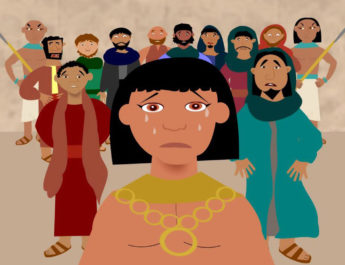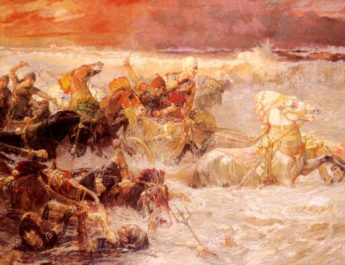Psalm 5
Ash Wednesday, Narrative Lectionary 330
To the leader:A for the flutes.B A PsalmC of David.D
A “leader” = natsach. Properly, something that glitters from a distance. So, something that stands out, excels, has status/standing (such as a chief musician or superintendent of Temple services). This can also mean to be permanent or enduring.
B “flutes” = nechilah. 1x in OT. Perhaps from chalil (a flute or pipe); from chalal (to pierce, to wound; figuratively, making someone or something profane or breaking your word; can mean to begin as though one opened a wedge; to eat something as a common thing). This is some kind of musical instrument that is pierced in the construction process – perhaps a flute.
C “Psalm” = mizmor. From zamar (making music; used specially of music to worship God; music with singing, singing praise, singing psalms); may be from zamar (to trim or prune). This is a melody or a psalm.
D “David” = david. From the same as dod (beloved, love, uncle); the root may mean to boil, which is used figuratively to describe love. So, this implies someone you love such as a friend, a lover, or a close family member like an uncle. David’s name likely means something like “beloved one.”
1 Give earE to my words, O Lord;F
give heedG to my sighing.H
E “give ear” = azan. Perhaps from ozen (ear, earing, audience, show; properly, broadness – applied to its ear in reference to its shape). Properly, this is to expand or broaden one’s ear i.e. listen intently, pay attention, heed.
F “Lord” = YHVH. From havah (to be, become) or hayah (to come to pass, become, be). This is the name of the God of Israel, the self-existent and eternal one, the tetragrammaton. This pronunciation has been lost to time so “Lord” is generally used in its place.
G “give heed” = bin. This is to discern, consider, attend to. It refers to distinguishing things in one’s mind or, more generally, to understand.
H “sighing” = hagig. 2x in OT. Perhaps akin to hagah (to speak, declare, make a sound, imagine, or mutter; a murmur, moan, or growl, whether from delight or anger; to study, ponder, or meditate). This is a whisper, musing, or groaning. It could be a complaint, meditation, or musing.
2 Listen to the soundI of my cry,J
my King and my God,K
for to you I pray.L
I “sound” = qol. This is a sound, used often for human voices. Also used when God speaks or angels, animals or instruments. It can be a cry or a noise, thunder or earthquakes and so on.
J “cry” = sheva. 1x in OT. From the same as shua (cry for help or riches); from shava (crying or shouting aloud, generally seeking freedom from some kind of trouble). This is cry or help.
K “God” = Elohim.
L “pray” = palal. This is to judge for oneself or in an official capacity. It can also mean to pray or make supplication, to entreat.
3 O Lord, in the morningM you hearN my voice;
in the morning I plead my caseO to you, and watch.P
M “morning” = boqer. From baqar (to seek, plow, break forth, admire, care for). This refers to the break of day. So it is dawn, early, morning, or morrow.
N “hear” = shama. This is to hear, call, consent, or consider. It implies listening intelligently, giving attention, and, because of these two factors, obedience and action are often implied.
O “plead my case” = arak. This is to arrange by setting in a row. It can also mean to set a battle, estimate, put in order, or compare.
P “watch” = tsaphah. This is to keep watch or spy – to look out. Properly, it refers to leaning forward to look out. It implies observing or awaiting.
4 For you are not a GodQ who delightsR in wickedness;S
evilT will not sojournU with you.
Q “God” = El.
R “delights” = chaphets. 11x in OT. From chaphets (properly, inclined towards or bending to; figuratively, to desire, delight in, or be pleased with). This is to delight in, desire, or show favor.
S “wickedness” = resha. From rasha (to be wicked, guilty, make trouble, do wrong; can also be condemn, guilty, inflict punishment; this verb implies disturbing or violating). This is wrong, particularly moral wrong. It can we wickedness, evil, wicked deeds, or something that is ill-gotten.
T “evil” = ra’. From ra’a’ (to be evil, bad, afflict; properly, to spoil – to destroy by breaking into pieces; figuratively, to cause something to be worthless; this is bad in a physical, social, or moral sense; that which displeases, to do harm or mischief, to punish or vex). This is bad, disagreeable, that which causes pain, misery, something having little or no value, something that is ethically bad, wicked, injury, calamity. This refers to anything that is not what it ought to be – a natural disaster, a disfigurement, an injury, a sin.
U “sojourn” = gur. Properly, this is the act of turning off the road for any reason. So, it means sojourning, becoming a guest. It can mean being fearful since one is outside of home territory. It can also mean dwelling, living, or inhabiting if one has turned off the root to encamp for a longer duration. This word is where the Hebrew “ger” comes from, which is the word translated “stranger” or “resident alien.”
5 The boastfulV will not stand before your eyes;
you hate all evildoers.W
6 You destroyX those who speak lies;Y
the Lord abhorsZ the bloodthirstyAA and deceitful.
V “boastful” = halal. This is to be clear – it originally referred to a sound, then a color. It was to shine and then make a show or boast then to rave. In a causative sense it came to mean celebrate, give glory, sing praise, or be worth of praise. Because of the celebratory nature of the word, it could also mean to give in marriage. This is where Hallelujah comes from.
W “evildoers” = paal + aven. Paal is to do, make, act, or accomplish. It is systematic and habitual action. Aven comes from a root that may mean panting as one does when expending a lot of energy, especially when it comes to nothing. This is nothingness, trouble, sorrow, distress, wickedness, evil, harm, sorrow, misfortune, and mischief. It is also used specifically to refer to idols.
X “destroy” = abad. To wander off, lose self. This implies to perish, destroy, die, vanish, or be broken or corrupt.
Y “lies” = kazab. From kazab (to lie, be false or in vain, to fail; to deceive in a literal or figurative sense). This is a lie or deception. It can also be used figuratively to refer to an idol.
Z “abhors” = taab. From toebah (abomination, loathsome, something morally disgusting or abhorrent). This is to abhor, despise, to reject, to act abominably.
AA “bloodthirsty” = ish + dam. Literally “man of blood.” Ish is perhaps from enosh (human, humankind, mortal); from anash (to be weak, sick, or frail). This is man, husband, another, or humankind. Dam is perhaps from damam (to cease, be or become mute, silent, still, cut off, hold peace, be astonished, die). This is blood, bloodshed, bloodguilt, lifeblood, and death. It is used for people and animals. More often blood from a wound or the blood of the innocent. Used figuratively for violence or for wine. Closely tied to life and death.
7 But I, through the abundanceBB of your steadfast love,CC
will enter your house,
I will bow downDD toward your holyEE templeFF
in aweGG of you.
BB “abundance” = rob. From rabab (to be or become much or many, multiply). This is any kind of abundance.
CC “steadfast love” = chesed. From chasad (being good, kind, merciful; may mean bowing one’s neck as is done in the presence of an equal for courtesy’s sake; so, if one in a superior position is treating you like an equal, that is what is captured here). This is favor, goodness, kindness, loving kindness, pity, reproach, or a good deed. When done by God to humanity, this is mercy/loving kindness. When done by humanity to God, it is piety.
DD “bow down” = shachah. This is to bow down, make a humble entreaty, to do homage to royalty or to God.
EE “holy” = qodesh. This is set apart and so sacred. God is different from us and so God is holy/set apart. Things we dedicate to God’s service are set apart for God and so they, too, are holy, etc.
FF “temple” = hekal. Perhaps from yakol (to be able, endure, overcome, prevail). This is a large building with public access such as a palace or temple.
GG “awe” = yirah. From yare (to fear, be afraid, dreadful; also fearful reverence – to fear in a moral sense is to say to revere, respect). This is fear or reverence.
8 LeadHH me, O Lord, in your righteousnessII
because of my enemies;JJ
make your wayKK straightLL before me.MM
HH “lead” = nachah. This is lead, guide, or bring. It can be used for transporting into exile or coming in as colonists. This is the word used in Psalm 23 “he leads me in the paths of righteousness.”
II “righteousness” = tsedaqah. From the same as tsedeq (rightness, righteousness, vindication. It is everything that is just or ethical. That which is right in a natural, moral, or legal sense. It also includes just weights (i.e. true weights). Figuratively, this is justice, righteousness, equity – even prosperity). This is righteousness, justice, righteous acts, and moral virtue.
JJ “enemies” = sharar 5x in OT. Related to shorer (foe, a treacherous watcher); from shur (to behold, see, watch, perceive; to spy out, lie in wait, lurk for; can also be to care for). This is an enemy or watcher.
KK “way” = derek. From darak (to tread, march, to walk. Can also mean affixing a string to a box since one needs to step on it to bend it in the process; so also an archer). This is a road as a thing that is walked on. Can be used figuratively for the path that one’s life takes or how one chooses to live one’s life.
LL “make…straight” = yashar. This is to be straight, right, even, smooth, or agreeable. Figuratively, it can be to make something pleasant or prosperous.
MM “before me” = paneh. Literally “before my face.”
9 For there is no truthNN in their mouths;
their heartsOO are destruction;PP
their throatsQQ are openRR graves;
they flatterSS with their tongues.
NN “truth” = kun. Properly, this means in a perpendicular position. So, it is set up in a literal sense – establish, fix, fasten, prepare. In a figurative sense, it is certainty, to be firm, faithfulness, render sure or prosperous.
OO “hearts” = qereb. Perhaps from qarab (to come near or approach). This is among, in the midst, before, the center It is the inward part, whether literal or figurative. It can also be used for the heart, the site of thoughts and feelings. This word is also used as a technical term for the entrails of the animals who are sacrificed.
PP “destruction” = havvah. 15x in OT. From havah (to become, get); from hava’ (to fall, become). This is a chasm, emptiness, or deep pit. It can be destruction or calamity. It can also be greed, craving, or mischief. It implies falling and ruin.
QQ “throats” = garon. 7x in OT. Perhaps from garah (to contend, provoke conflict, stir up strife, meddle; properly, to grate – figuratively to cause anger) OR from garar (to drag or drag off in a rough fashion, chew, sweep, destroy; to chew the cud). This is mouth, throat, head, or neck.
RR “open” = pathach. This is to open wide in a literal or figurative sense. So, it is open, draw out, let something go free, break forth. It can also mean to plow, engrave, or carve
SS “flatter” = chalaq. This is to be smooth in a figurative sense. So, it can refer to the stones that were part of casting lots – hence, apportion, share, distribute. Figuratively, it can also mean to flatter.
10 Make them bear their guilt,TT O God;
let them fallUU by their own counsels;VV
because of their many transgressionsWW cast them out,XX
for they have rebelledYY against you.
TT “make them bear their guilt” = asham. This is to be guilty, suffer, be punished; to destroy, condemn, be desolate, or perish.
UU “fall” = naphal. This is to fall, whether by accident, to fall prostrate, or to fall in violent death. Figuratively, it can refer to personal ruin or calamity, a city falling, an attack or a falling away. It can also be a deep sleep or wasting away.
VV “counsels” = moetsah. 7x in OT. From yaats (to counsel, advise, determine). This is counsel, plan, purpose, or device.
WW “transgressions” = pesha. From pasha (to rebel, offend, quarrel; making a break from proper authority so can also refer to an apostate). This is transgression, rebellion, or sin. It could be a revolt on a national scale or an individual moral one.
XX “cast…out” = nadach. This is scatter, seduce, banish, draw away, drive away, outcast, scatter. It means to push off in a literal or figurative sense so it could also be mislead, inflict, or withdraw.
YY “rebelled” = marah. This is to be contentious, rebellious, bitter, provoking, disobedient. It can be to be or make bitter or unpleasant. Figuratively, it is to rebel or resist and causatively to provoke. This is the root of “Miriam.”
11 But let all who take refugeZZ in you rejoice;AAA
let them everBBB sing for joy.CCC
Spread your protectionDDD over them,
so that those who love your nameEEE may exultFFF in you.
ZZ “who take refuge” = chasah. This is to take refuge or flee for protection. Figuratively, it means to hope or trust in someone or something.
AAA “let…rejoice” = samach. This is to rejoice or be glad. Properly, it is to brighten up in a literal or figurative sense.
BBB “ever” = olam. This is a long scope of time whether in the past (antiquity, ancient time) or in the future (eternal, everlasting).
CCC “let…sing for joy” = ranan. This is a cry of joy or a joyful song. Properly, it is emitting a shrill sound, especially one of joy.
DDD “spread…protection” = sakak. This is to cover or overshadow. It could also be to hedge or fence it. Figuratively, this could be to defend, protect, or join together.
EEE “name” = shem. May be from sum (to put, place, set). This is name, fame, renown. A name was thought to indicate something essential about a person – something about their individuality. So, this word can also mean honor, authority, or character.
FFF “exult” = alats. 8x in OT. This is to jump for joy, rejoice, triumph, or exult.
12 For you blessGGG the righteous,HHH O Lord;
you coverIII them with favorJJJ as with a shield.KKK
GGG “bless” = barak. This is to kneel, to bless. It is blessing God as part of worship and adoration or blessing humans to help them. It can be used as a euphemism to say curse God.
HHH “righteous” = tsaddiq. Related to “righteousness” in v8. From the same as tsedeq (see note II above). This is just, innocent, righteous, righteous one, or lawful.
III “cover” = atar. 7x in OT. This is surround in order to attack or protect. Also, this can be a crown in a literal or figurative sense.
JJJ “favor” = ratson. From ratsah (to be pleased with, delight, take pleasure in, or accept with favor; to approve or consent regarding something; can be used specifically of satisfying debts or being pardoned). This is delight shown in favor, good will, something that is accepted or acceptable.
KKK “shield” = tsinnah. From tsen (root may mean to be prickly; thorn, barb, cactus hedge). This is a hook or barb. It can also be a buckler, shield, target. Figuratively, it can refer to piercing cold.
Image credit: “Rising Sun” – Israel Nature Photography by Ary in the Negev.




